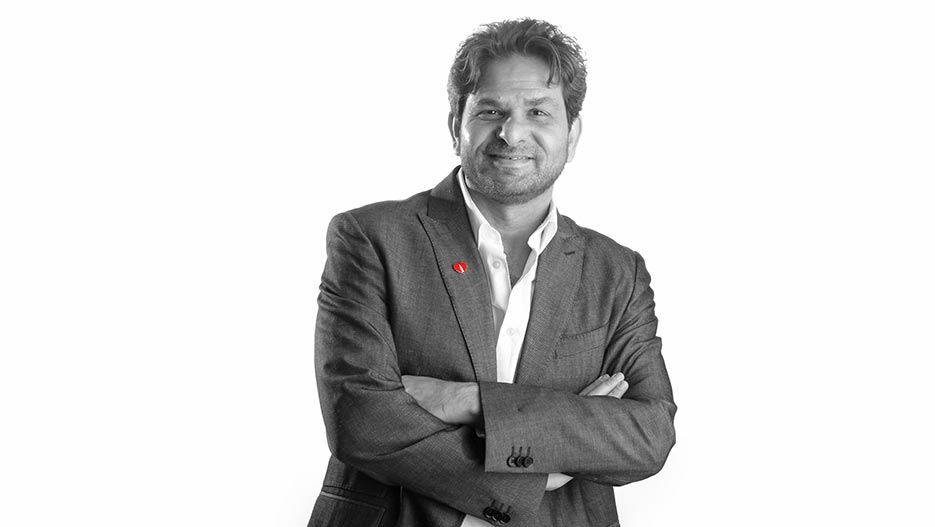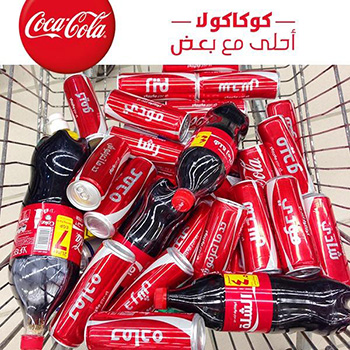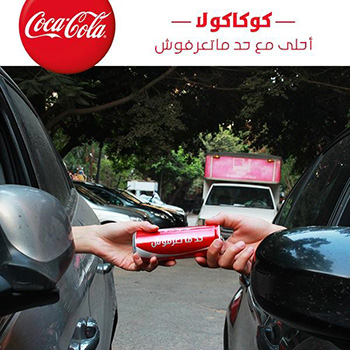Leading beverage company in Egypt and its commitment to the country
Coca-Cola has been a player in Egypt for over 70 years and it has established itself as the leading beverage company in the country. “Our biggest project here in Egypt is our partnership with the Egyptian Food Bank and our pledge to develop the hundred poorest villages in Egypt. This project will take us all the way into 2020,” explains Omar Mandour, General Manager of Coca-Cola Egypt, Yemen, Libya and South Sudan.
Interview with Interview with Omar Mandour, General Manager of Coca-Cola Egypt, Yemen, Libya and South Sudan

What is your overall evaluation of the Egyptian economy for this year?
I think that what will differ in 2014 versus previous years, especially since the revolution of 25th January 2011, will be the general mood in the country. As a population, we are very hopeful and businesses are very hopeful, too. I believe that since the country is settling down after our second presidential election, there will be a positive mood going forward. Whether this will have an effect on the economy, we shall have to see. I believe 2015 will be very important; some of the policies and laws concerning the financial market—such as fiscal laws and some of the investment laws that may change—will then have a positive effect.
What is your personal assessment of the retail business, and particularly the beverage sector that you are involved in?

The last three years in particular have witnessed lots of changes and trends. Not only in the food and beverage market but also in the fast moving consumer goods market. We are starting to see trends that are very much cued towards value. The value market will play a major role going forward—this is largely linked to the disposable income of consumers. Egyptian families have suffered for the last three to four years because of a slow-down of the economy and of their ability to save money. Savings have gone down tremendously and thus people do not have as much income available to spend on items that are not considered a necessity. With double-digit inflation and prices of some goods and services sharply increasing, consumers are basically caught between a rock and a hard place. This is why we started seeing value to play an important role here. Low cost items and low priced goods are becoming a category that is growing a lot in Egypt. Many consumers are trading off quality for a more affordable price.
Moving onto the company itself, could you tell us a bit about Coca-Cola’s presence in Egypt? What is the story behind Coca-Cola and what is your current market share?
Coca-Cola has been a player in Egypt for over 70 years. We entered the local market in 1942. We are very committed to the Egyptian market and we have been investing heavily in it. We are a total beverage operation because we have a juice business, a water business, as well as premium carbonated soft drinks and regular carbonated soft drinks. In addition, we also have a value proposition. When we talk about the total beverage market, we are the number one player in Egypt as a total beverage company.
Every year since 2010 we have been working closely with the Food Bank to help 10 villages a year. The development of the villages is not only in terms of infrastructure but also individual development. At the back end of this, we have a joint project with UNWOMEN that is focused on improving the lives of 4,000 women in these villages by providing them with microbusinesses.
It is also essential to mention your commitment to Egypt. What are some of your most successful community initiatives?
We are very committed to Egypt. During the time when the country and its people, were facing difficulties and political struggles to get to where we are right now, we as a company did not stop operating or investing. In fact, I remember that during the time of our first revolution back in 2011, we were the first company to start distribution operations, focusing at that time on water because there were many shortages. Thus, as a company we are very much committed to Egypt. In 2011, we launched our 3-year investment plan, where we pledged to invest more than 100 million dollars in Egypt over three years. This was at a time when people were very cautious about investment in Egypt, whether in the food and beverage sector or in other sectors. We had a big level of confidence in the economy and as a company and as an employer we stood side by side with Egyptians. Our support for the Egyptian economy goes beyond just investing in our business. We have a strong belief that we play an important role not only in the economy but also with regards to the community. This is part of the Coca-Cola fabric. If you look at our businesses worldwide, you will find various community programs where we are operating.
Our biggest project here in Egypt is our partnership with the Egyptian Food Bank and our pledge to develop the hundred poorest villages in Egypt. This project will take us all the way into 2020. Every year since 2010 we have been working closely with the Food Bank to develop 10 villages a year. The development of the villages include infrastructure development by refurbishing schools and medical centers, and connecting clean water to needy houses, in addition to providing micro-business to women. We also have a project that is focused on improving the lives of 4,000 women and their families in these villages which provides microbusinesses to women in rural areas. In almost 80% of Egyptian households, women are either the primary provider or a close second next to the husband. If you break this down, in 38% of households,  women are the sole providers. As part of our wish to support women in the community, we have pledged to help these 4,000 women. This project is in partnership with UNWOMEN. This is part of the global Five by Twenty Program that aims to support 5 million women globally by year 2020 to help improve their lives and their contributions to their families. These are the key comprehensive projects that aims to holistically develop communities and the families of these communities.
women are the sole providers. As part of our wish to support women in the community, we have pledged to help these 4,000 women. This project is in partnership with UNWOMEN. This is part of the global Five by Twenty Program that aims to support 5 million women globally by year 2020 to help improve their lives and their contributions to their families. These are the key comprehensive projects that aims to holistically develop communities and the families of these communities.
What would you say are the main challenges or obstacles that you face doing business in Egypt?
Putting the country back on track and having a secure situation is key. I think that this is one of the key challenges for the new government. This will then open avenues for other sectors such as tourism, which is a key source of our GDP, which represents about 17% of our national GDP. If this happens this year, and the government puts lots of effort into security, it will be strategic for the country. It is going to be a challenge not only for the government but also for all of us.
It all comes down to how the new government is going to address some of the infrastructure projects and opportunities that we have in the country—this is the key. I think that improving our roads and communication infrastructure is very essential for the overall growth of the economy.
Secondly, there is a need to introduce investment and fiscal legislation. We have been working with some legislation in the investment and fiscal sector, which is about 30 or 40 years old. We need this legislation to be updated to be as dynamic as it is in the rest of the world. It must benefit both the investors and the government.
Lastly, we need more training for our skilled labour force, both blue and white-collar workforces. Training is vital. The infrastructure and the level of skills in the workforce is what can distinguish Egypt as an investment destination from other countries. The qualified workforce in both the executive and labour sector is going to be a key reason why FDI will flow to Egypt.
What would be your personal vision for Egypt?
I am hopeful; I have to be as an Egyptian. Egypt has always been at the crossroads of the Middle East. This is not just a slogan that we say but it is a fact. The size of this country and its population, along with its geographical location in the heart of the Middle East, positions Egypt very well as a tourist and/or investment destination. These benefits are not man made; these are the natural characteristics of Egypt. Hence, with that in mind it is up to us how to use those resources to our advantage versus neighbouring countries or other countries in the wider Middle East.
Personally, I think that the new government has huge opportunities for a better future to Egypt, but they have to be ready and change the mind set on how to fully grasp these opportunities. If this happens, Egypt will be in a very different position in 2025; and that should be our first milestone. Some of the projects related to the infrastructure and reforms of education, legislation etc. will start to bear fruit in 5 to 10 years. We need to be patient. I see Egypt in the future as being the largest economy in the Middle East and Africa, and perhaps one of the top three largest economies within the next ten years.
Is there anything else that you would like to add?
Egypt has gone through a lot in the last five years, even in the last 35 years. It is about time that this country plays its rightful role in the Middle East. We are very optimistic. 35 years ago, we were at the forefront of the Middle East but we went on forced sabbatical and it is about time we woke up and regain our forefront position.
FAIR USE POLICY
This material (including media content) may not be published, broadcasted, rewritten, or redistributed. However, linking directly to the page (including the source, i.e. Marcopolis.net) is permitted and encouraged.